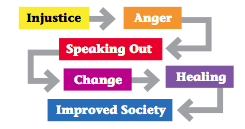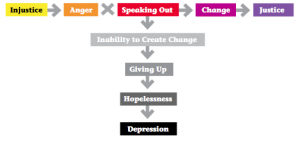Although depression is linked to sadness, and may be brought on by a period of grief, the difference between ‘a down patch’ due to life stresses or changes and true ‘depression’ is the ‘anger’ link. Moderate or severe depression always has a component of repressed anger, perhaps even anger that you think you do not have a right to feel, and in the mind/body philosophy self-harm is anger you think you do not have a right to feel, turned back on to the self. People with suppressed anger will often turn to ‘self-medication’ using food, alcohol, drugs or other addictive behaviours to stop the thoughts and numb the pain.
Anger is an important emotion that is designed to heal, or change, injustice. When injustice is perceived, the power of anger should be used to create change in the environment so that this does not continue. In this way the individual and the society moves forward, making changes to the cultural structure for the betterment of all.
However the healing flow can be interrupted – typically at stage three ‘Speaking out’ – and the anger festers and boils within. Eventually the individual may give up the struggle to create change, give up hope that change can occur, and become ‘hope-less’ which is the beginning of depression. As the lack of hope for the future permeates the depression will grow, eventually leading to lack of all hope or belief in the possibilities of life.
The most common reasons for an interruption in the flow of the normal Injustice/Change pattern are:
• The individual learns that being angry is not safe as someone else in their environment will become more angry, threatening, and perhaps violent.
• The expression of personal desires is not allowed within the individual’s environment.
• The complaint of the individual is either not believed or given any validity.
• The individual feels angry but then feels guilt at having that anger and the original issue remains unresolved.
• Lack of training of children in how anger should be used leading to unresolved issues.
Small children don’t know how to verbalise and discuss which is why they scream and hit when they are angry. Negotiation is something we should all learn as we are growing up.
Managing anger and depression in the classroom.
An angry child is ‘perceiving’ an injustice so one of the most helpful strategies is simply to reflect the emotion you see – “Wow, you seem really angry about something… (pause)..What happened?” and then use the phrase – “So you don’t think that was fair?” Then simply register words and sounds that show you are listening, “Hmm, Ah ha, Gosh” etc. In a ‘sand-box’ situation it is often the child who hits out after an injustice has been perpetrated upon them, that gets into trouble. It can be helpful to look back for the original incident and give that the main focus. Remember anger is about perceived injustice and sometimes there was no actual injustice or there is just no ability to ‘right the wrong’. However often we don’t actually need to. Sometimes just acknowledging that the child’s feelings have validity, just being there to say “I hear what you have to say” is all that is necessary or appropriate.
Important note: Please encourage anyone feeling overburdened by anxiety or depression to seek personal support and professional assistance.


